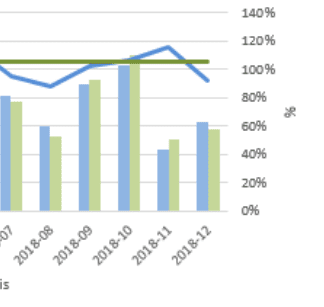Description
As a Manufacturing Manager, Will is responsible for overseeing the entire manufacturing process, from the acquisition of raw materials to the production and delivery of finished products. He coordinates with various departments, such as engineering, quality control, and logistics, to ensure that all manufacturing operations run smoothly and efficiently. Will is also responsible for managing the budget, ensuring compliance with safety regulations, and implementing strategies to optimize production and reduce costs.
Job description:
Job Title: Manufacturing Manager
Job Summary: The Manufacturing Manager is responsible for overseeing all aspects of the manufacturing process, ensuring that products are produced efficiently, safely, and at the highest quality standards. This role involves managing a team of manufacturing staff, including production supervisors, quality control technicians, and operators. The Manufacturing Manager also ensures that all manufacturing processes are compliant with industry regulations and standards, and works closely with other departments to ensure that production schedules are met.
Key Responsibilities:
- Oversee the daily operations of the manufacturing facility, ensuring that production targets are met, and quality standards are maintained
- Develop and implement production plans and schedules, in line with customer requirements and company goals
- Manage a team of production supervisors, quality control technicians, and operators, providing guidance and support as needed
- Monitor and analyze production data, identify areas for improvement, and implement process improvements to increase efficiency and reduce costs
- Ensure that all manufacturing processes are compliant with industry regulations and standards, and work with other departments to maintain compliance with environmental, health and safety regulations
- Develop and maintain relationships with suppliers, customers, and other stakeholders, and ensure that customer needs are met
- Maintain and manage inventory levels to ensure that production runs smoothly and materials are available as needed
- Identify and implement cost-saving initiatives to increase profitability and reduce waste
Qualifications:
- Bachelor’s degree in Engineering, Operations Management, or a related field
- Minimum of 5 years of experience in a manufacturing environment, with at least 2 years in a management or supervisory role
- Strong knowledge of manufacturing processes and best practices, as well as industry regulations and standards
- Excellent leadership, communication, and interpersonal skills
- Strong analytical and problem-solving skills, with the ability to identify and implement process improvements
- Proficiency in Microsoft Office Suite, including Excel, Word, and PowerPoint
- Ability to work in a fast-paced, dynamic environment, and manage multiple projects simultaneously
- Knowledge of lean manufacturing principles is a plus.
Physical Requirements: The Manufacturing Manager must be able to stand for long periods, lift and carry up to 50 pounds, and work in a noisy and fast-paced environment. They must also be able to use a computer and other office equipment for extended periods.
If you are looking to strengthen your skills as a Manufacturing Manager in an industrial company without seeking employment, there are a few training options you can pursue. Here are some original and professional training proposals that may help you:
- Online Courses: There are numerous online courses available that can help you enhance your manufacturing management skills. Some of the popular platforms for online courses are Coursera, Udemy, and LinkedIn Learning. These courses cover topics such as Lean Manufacturing, Six Sigma, Quality Management, Project Management, and Leadership.
- Industry Certification: You can also consider getting certified in a manufacturing-related program such as Certified Manufacturing Technologist (CMfgT) or Certified Manufacturing Engineer (CMfgE) by the Society of Manufacturing Engineers (SME). These certifications demonstrate your expertise and knowledge in the manufacturing industry and are recognized globally.
- Industry Association Membership: Joining a manufacturing industry association such as the National Association of Manufacturers (NAM) or the Manufacturing Institute can help you stay up-to-date with the latest industry trends and best practices. These associations provide networking opportunities, access to industry research, and professional development opportunities.
- Technical Skills Training: As a manufacturing manager, it’s essential to have technical skills related to the manufacturing process. You can consider taking training in specific manufacturing technologies such as Robotics, 3D Printing, and CNC Machining.
- Soft Skills Training: Being a successful manufacturing manager requires excellent communication, leadership, and teamwork skills. You can take training in areas such as Conflict Resolution, Communication Skills, and Leadership to enhance your soft skills.
- Continuous Improvement Programs: You can also implement continuous improvement programs such as Kaizen, Lean, and Six Sigma in your personal projects to enhance your skills. This will demonstrate your expertise in implementing these programs, which are highly valued by industrial companies.
In conclusion, by taking online courses, getting certified, joining industry associations, acquiring technical and soft skills training, and implementing continuous improvement programs, you can strengthen your skills as a manufacturing manager and improve your chances of success in the manufacturing industry.
Interview question
- What experience do you have in managing manufacturing processes and teams?
Answer: I have over 10 years of experience managing manufacturing processes and teams, which includes managing production schedules, quality control, and cost optimization.
- How do you ensure that production targets are met while maintaining product quality?
Answer: I believe in having a strong team that is properly trained and equipped with the necessary resources to ensure that production targets are met while maintaining product quality. I also believe in continuous improvement processes and regularly reviewing performance metrics to identify areas for improvement.
- What strategies do you use to reduce waste and improve operational efficiency?
Answer: I prioritize the use of lean manufacturing principles, which involve identifying and eliminating wasteful processes and procedures. Additionally, I am always looking for ways to optimize the use of resources and streamline operations to reduce waste and improve efficiency.
- How do you ensure compliance with safety and regulatory standards in a manufacturing facility?
Answer: Safety and regulatory compliance are critical in a manufacturing facility. I prioritize regular training for all employees, proper equipment maintenance, and conducting regular safety audits to ensure that all safety and regulatory standards are being met.
- What are your strategies for managing a diverse workforce and ensuring effective communication among team members?
Answer: I believe in open communication, active listening, and creating a positive work environment. I encourage feedback from all team members and prioritize diversity and inclusivity in hiring and management practices.
- Can you provide an example of a challenging situation you faced in managing a manufacturing facility and how you resolved it?
Answer: One challenging situation I faced was a sudden increase in demand for a particular product. I worked with the team to optimize the production process, re-allocate resources, and prioritize production schedules to meet the demand without compromising on quality.
- How do you handle conflicts or disagreements among team members or departments?
Answer: I prioritize open communication and finding common ground to resolve conflicts or disagreements. I encourage all team members to voice their concerns and perspectives and work collaboratively to find a solution.
- How do you stay up-to-date with industry trends and advancements in manufacturing technology?
Answer: I regularly attend industry conferences, read industry publications, and network with other professionals in the manufacturing industry to stay informed of new advancements and trends.
- How do you ensure that your team is properly trained and equipped with the necessary skills and resources to perform their jobs effectively?
Answer: I prioritize regular training and development programs, cross-training opportunities, and providing the necessary resources and tools to ensure that my team is equipped with the necessary skills and knowledge to perform their jobs effectively.
- What are your long-term goals for the manufacturing facility that you manage?
Answer: My long-term goals are to continue improving operational efficiency, reducing waste, and increasing productivity while maintaining product quality and compliance with safety and regulatory standards. I also aim to create a positive work environment that prioritizes employee growth and development.



